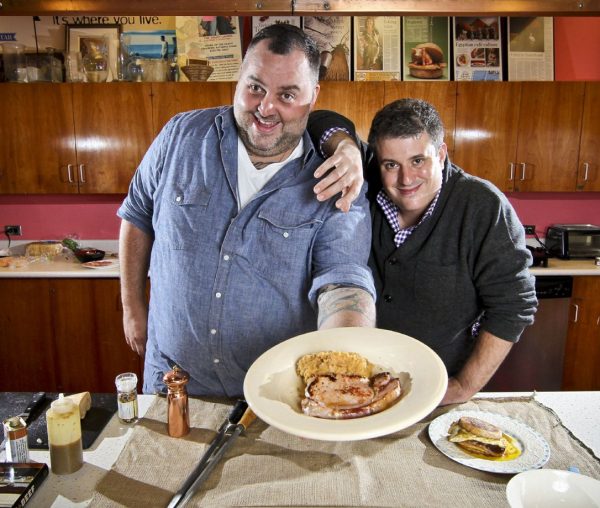 by Ben McCarthy
by Ben McCarthy
Montreal’s Joe Beef was a restaurant built on excess, and its owners, Fred Morin and Dave McMillan, were the poster children for unrivaled eating and drinking: foie gras, truffles, the finest wines. The two men had it all, and their restaurants flourished, buoyed by this over-the top persona of excess and near gluttony. Anyone who knows anything about food knows the name Joe Beef; Morin and McMillan have served everyone from Barack Obama to Justin Trudeau; they were close friends with the late Anthony Bourdain. They were known the world over for their overindulgence.
Recently, though, the two men have made serious changes in their own lives. Their new cookbook, Joe Beef: Surviving the Apocalypse, is itself a fresh iteration of the Joe Beef legacy. I spoke to Morin about the new Joe Beef cookbook, getting sober, and about dealing with celiac disease (a serious autoimmune condition which Morin has suffered from for some time now).
How has being diagnosed with celiac disease affected your life as a chef ?
Traveling. It’s alright to live at home with celiac, it’s easy. The traveling part and the beer part and the this and the that. Food52 or somewhere asked Dave and I to do this thing where chefs travel and you get to do your food diary and list everything you ate on your trip and I’m like, “Yeah sure, but it’s going to be fucking annoying and boring. It’s going to be how much I like Whole Foods cause I can get six green juices, 12 gluten free power bars,” you know? It’s not very rock and roll.
With celiac, statistically you’re more at risk for basically every cancer, and that’s the shit part of it. When you go to a restaurant, you can see it in the waiter’s face sometimes, like, “Oh fuck, I think there was gluten in that.” And then they see you don’t die, and that for them is just the proof that you’re not really allergic. You don’t want to bore them with science or detailed descriptions of your aches and pains, but it’s a serious thing, a very serious condition.
With diabetes, for example, which is also a serious thing, you can pretty much know what’s good for you. A green salad with lots of veggies is gonna be good for you, or not harmful. But you can’t say the same for celiac because there is so much cheating in kitchens and so many food service companies selling stuff that is made outside the premises of the restaurant, and so there is no way to know.
Dietary restrictions have become very common. What role do you think chefs should play in catering to such restrictions?
I love love love working with this generation–call them hipsters or whatever you call them–because I think it’s a generation aware of different issues like sexuality and gender and race and they have definitely more awareness and a kinder, gentler view of the world than the generations before. And it’s not just the urban generation. Even people from like a military background, for example, they’ll agree that PTSD is an issue, they’ll talk about their feelings. It’s a much better time to be around, and those people are great to be around. So the people in charge at the restaurant are all people from that generation, so being in the kitchen where the guys are working with buckwheat (a naturally gluten free grain), and it’s not an alternative, is a pleasure.
We have a dessert, and it’s a wonderful cake that is all based on buckwheat, and they’re doing it because they love the taste of buckwheat, not because they thought they had to replace flour. I’m the guy who personally loves classic French food and who has no problem with a flour-based sauce, and I’m the one who is struggling to find an alternative to the classic sauces. But again, you turn around and you look at what French cuisine was and there was rarely a lot of flour and there are a lot of things that are just gluten free by nature. In the spring, if you roast a leg of lamb with like forty cloves of garlic and half a bottle of wine in the pot and a handful of thyme you don’t need the flour in there, you know? It’s an everyday challenge for me, and I don’t find it difficult as much as fucking boring.
I think alcohol was making it hard, because you drink and you think, “Oh, it doesn’t matter if I eat some gluten by accident” but it really does matter, if you’re celiac and you’re eating gluten like that you’re slowly killing yourself.
So do you think restaurants have a role to play in catering to various conditions, be they autoimmune diseases like celiac or allergies and dietary restrictions?
Restaurants are expensive, and because of that we can’t fuck with people’s requests. It’s just important. There are people who have medical conditions. I lost a dear friend to cancer last year, and he didn’t eat a lot when he was sick but he didn’t want to order a half cup of soup in a restaurant, he wanted to order a full three courses, that’s part of your integrity and your ego, you know? Most of the issues that arise now are not insensitivity or assholeness, it’s just unawareness. They just don’t know. And people working at restaurants will make mistakes once in a while, but you just can’t repeat the mistake; that’s what’s important. What makes you a good person is being able to say, “Fuck it, I was an asshole there, I served gluten, and I tried to hide it. That’s wrong and I’ll be proactive about it and change it.” If you’re celiac and you show up to a restaurant and you encounter kind people, that’s the solution. The solution is not a recipe or a molecule or a blood test. The solution is kindness.
You and your partner, Dave McMillan, are known the world over for being serious gourmands and reveling in the unapologetic pleasure of eating and drinking. How do you reconcile that with your celiac disease?
I wish I could be the guy who just merrily eats everything he sees, like Bourdain, all the excesses and everything. You don’t want to eat like a gym rat, like a fucking keto diet, that’s excessive in the opposite way and you’re always grumpy and it’s not fun. You know, I decided to quit drinking and I went to AA meetings and I talked about it to a few people, I talked about it to my friends. The thing they have [AA], the group, imagine if whenever you’re pissed off about having celiac disease, once a week or whatever, you have a group of people who say, “Fuck shit” and you say “Fuck shit” together and you have a coffee and a gluten free cookie [laughs] and you get out of there and you feel better–a little support group. Maybe it sounds silly, but it helps.
What are some of your favorite things to eat and drink these days? Is there anything that you have gotten really into after having to adopt a gluten free diet?
Whole foods, man. Not the store, but just foods that are unprocessed and whole, just like the purity of good meat and great vegetables. And also, the on-the-go food, the whole 300 calorie energy bar (that is gluten free) industry is seriously a life-saver, you know? I’m always curious to see what they are doing.
I wish there was more regulation because sometimes it’s so hard to just find something that is safe for me as a celiac to eat. The reading labels and all the lies and hurdles you have to go through in the grocery just to get your food and I can see it even more now because my kid [who also has celiac disease], he’s starting to understand it too, that it sucks. It sucks being celiac. The thing is [Dave and I] have to play with that, reconcile the fact that, yeah, our notoriety is being cooks and apostles of excess on one hand, and on the other hand being paralyzed at the grocery store and at home because you can’t eat anything.
Finally, you have a new cookbook out, Joe Beef: Surviving the Apocalypse. Can you tell me a little bit about the book and where the idea came from?
The first book, The Art of Living According to Joe Beef: A Cookbook of Sorts, was a very easy book to write. We were young and we had this restaurant that was popular and it was great, and we had recipes and stories to tell and a bunch of things to talk about but the second book, Joe Beef: Surviving the Apocalypse, we were like, “ooof.” We said everything that was fundamentally us in the first book. Me being celiac and David being sober it was like, “Oh, what do we have left? We can’t still preach the excess, it’s not us anymore.”
But, you know, when we’re looking at the world and what success is now, like Kim Kardashian and millions of followers and that’s success, we don’t fit in but we can’t avoid playing and that’s literally the end of the world for us. Everything we like to do involves like first aid kits and fishing and hunting and that was the obvious book to write, Surviving the Apocalypse.
Nyack’s Ben McCarthy is the lead guitarist in the alternative rock band Regret the Hour and the chief culinary correspondent for Nyack News and Views.
See also:








